In terms of heating, what is better, a swimming pool heater or heat pump?
Every year, like clockwork, pool owners ask us this question. Both swimming pool heaters and heat pumps provide excellent heat sources for pool heating. Honestly, the answer depends on a couple of different factors. Comparatively, they are unique to the pool owner’s needs and wants.
Before making your purchase, let’s discuss the pros and cons of swimming pool heaters and heat pumps.
Pool Heaters
 In short, gas heaters are most comparable to your home water heater. As your pool water passes through the unit, the heat exchanger heats the water and returns back to your pool. To operate the heater, you need access to propane or natural gas. Depending on where you live, one or the other might be readily available and/or much cheaper. In comparison to heat pumps, pool heaters have lower upfront costs. However, when you’re shopping, don’t forget to calculate the cost of propane or natural gas needed to operate the heater. The costs of gas might exceed the cost of a heat pump.
In short, gas heaters are most comparable to your home water heater. As your pool water passes through the unit, the heat exchanger heats the water and returns back to your pool. To operate the heater, you need access to propane or natural gas. Depending on where you live, one or the other might be readily available and/or much cheaper. In comparison to heat pumps, pool heaters have lower upfront costs. However, when you’re shopping, don’t forget to calculate the cost of propane or natural gas needed to operate the heater. The costs of gas might exceed the cost of a heat pump.
Still, pool heaters are perfect for pool owners who live in cold areas and are looking to keep their pool open all year. In fact, they are the quickest way to heat your pool. In most cases, you can raise your water’s temperature by one to three degrees per hour. Additionally, if you own a pool and spa combo, a pool heater is the way to go. A heat pump doesn’t have enough power to heat both simultaneously.
Also, if this is your first pool heater, determine if you have an underground gas line for installation. If you don’t have an existing gas line, we recommend calling to get an estimate before purchasing your heater. Sometimes, the price of the gas line is more expensive than anticipated.
Manufacturers do not recommend homeowners installing pool heaters themselves. In fact, you void the warranty on your heater if you fail to hire a licensed pool technician.
A Pool Heater Is Perfect For:
- Quickly heating your water
- Colder temperature areas
- Extending your swimming season a few months or keeping it open all year
- Pool and spa combinations

Heater Related Content
Pool Heat Pumps
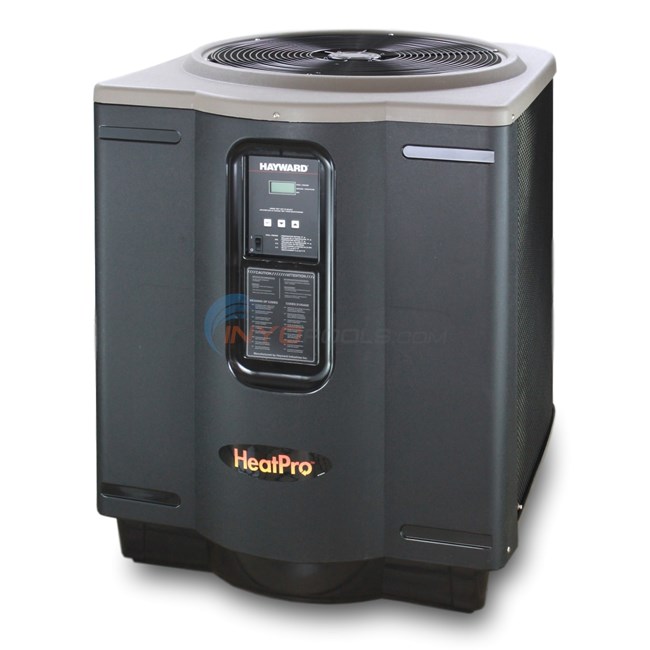 Pool heat pumps actually work in reverse of your home air conditioning unit. Unlike heaters, pool heat pumps use the ambient air surrounding the unit to heat your pool’s water. In short, the unit transfers the heat from the outside air to heat the water.
Pool heat pumps actually work in reverse of your home air conditioning unit. Unlike heaters, pool heat pumps use the ambient air surrounding the unit to heat your pool’s water. In short, the unit transfers the heat from the outside air to heat the water.
This creates a problem for pools in colder areas. Once temperatures drop below 50 degrees F, the heat pump loses the ability to effectively heat your pool. So, if your area is consistently below 50 degrees F, a heat pump may not be the best option for you.
Generally, heat pumps are more expensive than heaters. However, the cost to run a heat pump is dramatically lower than the consumption of a gas heater. This makes heat pumps the most efficient way to heat a pool. In fact, the cost to operate a heat pump is only a fraction of the costs of propane or natural gas. Sometimes, the upfront costs of the heat pump are cheaper than the overall costs of a pool heater.
A Pool Heat Pump Is Perfect For:
- Single body pools
- Areas with warmer temperatures (greater than 50 degrees F)
- Extending your swimming season a few weeks
- Saving money on gas
Heat Pump Related Content
Pool Heater or Heat Pump?
Should you purchase a pool heater or heat pump?
Heaters and heat pumps are great solutions for swimming in a cold pool. However, before purchasing one, determine exactly what your needs are.
If you live in a colder climate and are interested in extending your pool season or simply looking to heat your water fairly quickly, we recommend a pool heater. Also, if you have a pool and spa combination, invest in a pool heater.
On the other hand, if the area you live in doesn’t normally drop below 50 degrees F, like Florida, we recommend a heat pump. Heat pumps are great options for pool owners who simply want to keep their pools warmer during their normal swimming season.
Whether you choose a swimming pool heater or a heat pump, make sure it benefits your needs. If you have any other questions regarding heaters, heat pumps, and what may be the best option for your pool, sound off in the comments below.

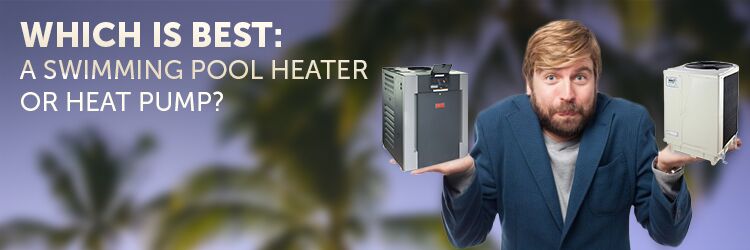



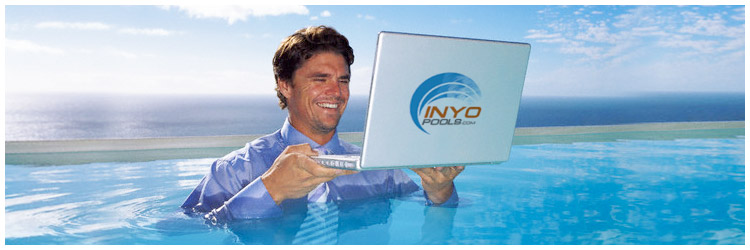
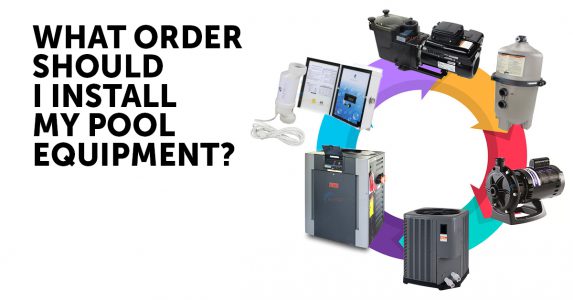
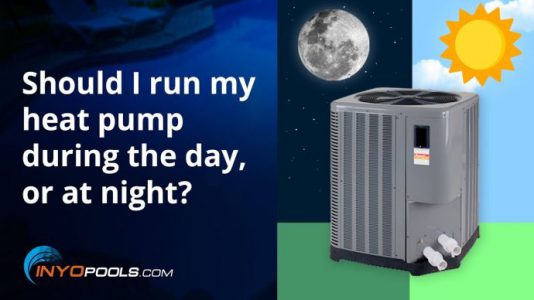
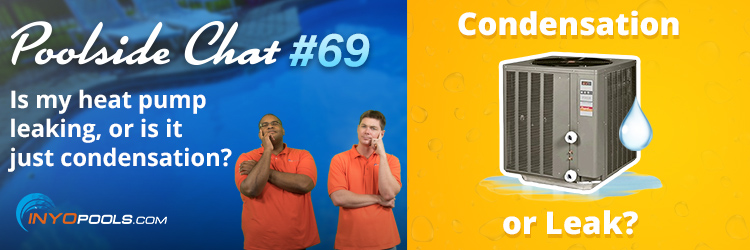






Thanks for sharing very interesting blog regarding swimming pool heater or heat pump.
I have a public underground pool with a small kid pool and a jacuzzi,also I have two small private pool. Can you tell me I can use a large heat pump for all of them?
I mean Is a heat pump able to warm up pool’s water and jaccuzzi’s water at the same time or they need to have seprate heat exchanger?
Hello, we are looking to buy a house in Melbourne FL. It has an inground pool without a heater but we would like to be able to use the pool year-round. There are no gas lines in the area. The temp in that part of FL can drop below 50 but it is usually for short periods of time (few days). The average low temp in Jan and Feb is about 50deg but it gets into the 70s during the day. Would a heat pump work for heating the pool year-round? Are those two months of cold nights problematic?
As long as you run the heat pump during the day time when the temps are suitable for operation, in combination with a solar cover, you should be able to heat the pool pretty easily. The solar cover is to lock in the heat.
I live in chicago and really would like to heat my 16 ft round pool for my wife and grandkids Running a gas line would be both impractical and very expensive I was looking for an electric heater but am unable to find one that would effectively heat my pool. Any suggestions?
Hi – I love your articles (thanks for all of the helpful information). I live just outside Philadelphia and would like to extend my swimming season from early May (temp range from 50s-70s) thru end of September (temp range from 60-80). I am debating between a propane heater (NG not an option) and a heat pump. My in-ground pool is 609 sq ft (about 35×17) and around 22,000gal, I have a solar cover that we keep on anytime we aren’t swimming, ideal swimming temp would be 83-85 degrees. Normally our pool takes a long time to warm up because we only get sun part of the day but the solar cover keeps in what we get. Any suggestions? thank you!
If you want to extend the season into late September, your best option is the propane heater. Heat pumps are sensitive to ambient temperature. The lower the temp outside, the less efficient the heat pump becomes. By going into late September, the heat pump will struggle to maintain temps, causing you to run it and your pump for longer than you want.
Hi I currenlty have a heat pump and was wondering if i could add a gas heater as well to run on the cold days. Was wondering if running both together would work?
Yes, you can plumb the heat pump and gas heater in sequence. At least how I have seen it, the usual order is to put the heat pump before the gas heater. The heater pump goes before the heater because it is more efficient and can usually handle most of the heating duties. The gas heater is second to make up the difference if the heat pump does not work at peak efficiency.
We have built a 16×33 in ground pool and live in MD. We are looking to install solar system for our electric home but we are still trying to figure out what heating system we should purchase gas or electric. Our goal is to be able to use it end of May without it being freezing cold, and September same reason
We live in Long Island Ny. Just installed a 18×34 inground pool. We would like to be able to use it from Memorial Day to Labor Day. We are not sure if we should get a gas heater or an electric heat pump. We’ve priced out both and with installation they would both cost about $6,000. We are not weekend worriers. We would use the pool all week. What do you think?
As the article brings up in a few places there are things you need to consider: the cost of gas and electricity, the time of year you want to use the pool, and the temp you wish to maintain.
I know the time of year you want to use it, but I am missing the other two.
I live in Long Island, New York, I have a in ground pool of 20000 gallons, I also have gas connection in my house, I would like to have the temperature of my pool water to be around 80 specially in the evening up to September, while the pool is planned to be open end of May ,though the temperature is not yet soothing to swim . Want to have a heated pool , but not sure which version should be suitable for me, in fact my main focus is to use the pool at least for 2 hours with a temperature nearing 80. Which option would be suitable for me , I checked the heat pump that is costing me about 2500$ to install , I am not sure how much would be the cost for gas heater , and how much could be the monthly cost heating the water. Looking for an advise please
Hi, I am from SW Michigan and just bought a house with an indoor in-ground pool. The previous owner forgot to mention the pool heater doesn’t work well, but was listed as new in 2017. We questioned this as the pool never got warm and the unit is like 30 years old. They said it was the pool hanging room heater that was new. Is the use of the room heater enough to keep a heat pump happy, or should we do heater? The pool is 25 x 32 and we have natural gas hooked up and electric and we want that pool as warm as we can get it here to warm up our cranky joints! We also keep a solar cover on the top of the water to keep evaporation low. Can u please help? Thank u!
I live in Camarillo, I have a sports pool which size is 16X27. 3′ on one end, 4′ on the other end, and 6′ in middle. normally when I ask heater or heat pump, I always get the answer heater. But I had electric Solar installed last year and sized it to include pool pump, and A/C, the 2 big draws. In colder day I won’t be using A/C. Now the question, would you recommend heater or heat pump.
You skipped over a lot of what you need to consider. First, what is the cost of gas and electricity in your area? If gas is expensive in your area, then it would rule that one out pretty quick. The solar power helps the heat pump in this category. Second what temperatures are you going to be using the heater in? Anything below 60 degrees, a heat pump is going to be useless unless you get the special low ambient type. Third, what temperature do you want to maintain the pool? If you want to maintain tempos around 80 or so, the heat pump is an option. But if you want 85 and higher, then you probably want to go with the heater.
I have a 25,000 old fashioned Inground pool. 9′ deep & 3′ shallow. Propane is as expensive as electric but I recently had a new 200amp box installed & removed my existing jetted jacuzzi in the hope we could just heat the Inground pool. I don’t want to go back to propane because of piping & big massive tank outside. It would be wonderful to have an idea what heat pump would work.
Orlando region of Florida.
Pool has a 8′ privacy fence.
No present pool cover
Wife likes 104° in the jetted jacuzzi so pool @ least 92°-100° I’m guessing.
Not going to get another separate jetted jacuzzi since I’m converting the back porch area to a top canopy BBQ, sink, dishwasher, tanning chairs, & eating tbls. I’m installing soft start systems in my 5 ton a/c for power conservation & could further replace current pool pump with a more efficient one.
What make/model & estimated monthly cost would we be looking @?
Thanks
I live in CA 92880. I need pool heater for size 16×32 ft what type is economy used gas propane or electric. My question economy for monthly bill electric or gas propane??
We cover this exact question in this article and give you links to further reading for a detailed explanation on which may be better. But in summary, it depends on the cost of gas and electricity, your pool size, plus the desired temperature you want to maintain. For the more detailed information, I would refer to the article and follow the links therein.
I’m looking to heat my hot tub at my cabin quickly. We pump in lake water (70 Fahrenheit) and prefer for it to heat to 101 F within an hour or two. We were using a 150,000 BTU propane heater to accomplish this but it just died. Since our cabin runs electricity mostly off solar I wam wondering if a heat pump is a better option to reduce propane costs. Would a heat pump warm up the hot tub from 70 to 101 in only a few hours?
No, it cannot. You would need a gas or electric heater for that typing of rise in heat.
I live in Philadelphia are and have an inground pool. 16×32 5,000 gallons. I don’t have gas lines so Im wondering if heat pump will work for me. I’m looking to warm up the water quickly when I open the pool around Memorial Day weekend and to warm it up when we get a cool spell in summer. Temps at night in summer have gone down to mid 50’s at times but never below 50. Model recommendations would be helpful as well. Thanks
Raypak Compact Series Heat Pump 80,000 BTU – 016631 or larger
Hi Dale, what did you decide? We ha the same size going in in a few week. We have geothermal electric and no natural gas, just propane. Curious what you decided!
What did you go with? We’ve been on the fence for 3 years on not knowing what route to go
Hi Dale – Did you end up with a heat pump? I’m right outside Philly and am debating between a heat pump and a propane gas heater. thanks
So, in Phoenix we have a different problem.. we’d like to keep the pool 10-15 deg COOLER in the summer when it’s 115 air temp and pools are routinely at 85-100 water temp. Swimming is not a refreshing experience when the water is that warm. Will a properly sized HP accomplish that? We’re thinking 5 ton HP for a 15k gal pool.
I have a above ground pool that is 22000 gallons and was wondering if a electric heat pump would work well. It super pricy to run the propane gas line the distance we would need to go but don’t want to purchase the electric heat pump if it’s not a good option with my size pool.
You can get a larger sized heat pump, the things to consider whether or not a heat pump will work for you is summarized in the last section of the article.
Existing in gfound pool looking to add a heater but there is a poolhouse where all of the equipment is located.
Is there a gas heater that can be installed in a poolhouse?
All of mine have been outside so no ned of venting.
Yes, a pool heater can be installed in an enclosed room, but there would need to be ventilation to allow in fresh air and an indoor vent kit would be required. Every pool heater has its own specified kit for indoor installations.
Perfect Thanks!
We are building a large inground pool and spa in the palm springs area. We are hoping to heat the pool to 83 degrees Jan through April. In jan and feb, the low temps can be 45-50 degrees, though the highs are in the 70s. Should we install a heater or heat pump? Someone told us to install both – the heater to get it up to temperature and the heat pump to keep it at temperature. Your thoughts?
If you have the budget to get both, then do that because it is the ideal situation. But if you were to only do the one unit, I’d choose the gas heater, mainly for the winter months. Most heat pumps are not going to work in temperatures below 60 degrees; plus their ability to raise the temperature is strongly tied to the ambient air temp. Also, with the spa, when you want the heat you will want it NOW; gas is the only way to get that.
Is a heat pump efficient enough in dry climates? Southern California can have very dry humidity levels. It seems as heat pumps are popular where humidity can be high, like Florida.
OK, thank you for the information.
OK, thank you very much.
The heat pumps I was looking at are the Arctic SPA-025ZA, 10 kW, 35,000 BTU, and the SPA-045ZA, 15 kW, 50,000 BTU. They are made to operate in low ambient temperatures down to 20°F and also have a chiller function. Or should I be looking at electric resistance heaters rather than heat pumps, given the small size of my pools? However, I am concerned that electric resistance heaters may be too expensive to operate.
I’m not familiar with those models, but spa electric heaters are going to be around 11 kW to 27 kW range like the Raypak E3T
I live in Central Florida. I am not able to afford an in-ground pool and am working with the small amount of enclosed space that I have on my screen porch. There I have set up two small above- ground pools, a kiddie pool (about 500 gallons), which I filled in January but haven’t been able to use, yet, because the water has been too cold, and a deeper iPool therapy pool (about 1270 gallons), that I plan to fill soon. Both are strictly for me and my dog. I want to heat both with one heater and keep them both around the same temperature, comfortably warm, but not hot. I may have to heat one at a time. I do not have natural gas. I am looking at a heat pump for spas that claims to work even below 50° F, that also has a chiller function. I don’t know what propane would cost, but I would rather spend more up front on a heat pump than to have high monthly electric bills in the future. Suggestions?
A heat pump, that also has a chiller function, while also being a low ambient temp model is going to be a hard find. If your main concern is the heating then the Hayward HeatPro Heat Pump 140,000 BTU (Low Ambient) – HP21404TC would be a good option. There is also the AquaCal HeatWave SuperQuiet Heat Pump 101,000 BTU – SQ125AHDSBNP.
If you have no available breakers, you will have to expand your electrical service. There are plenty of automation systems on the market that could be set up in the configuration you described, however that wouldn’t be a practical solution. It would be difficult to maintain desired temperatures and proper circulation running only one at a time. The good news is, many of the automation systems include a sub-panel.
I have a 200 amp service I have a hot tub tub which draws 50 amps and I will need 80 amps to run my pool and heater, my Box is full with other breakers to run my home how can I use a heat pump for my swimming pool and keep my hot tub heated at the same time is there any mechanism that will shut the hot tub down while my pool is heating my heat pump and hot tub runs on demand. I don’t know if there’s a timer they can turn the hot tub off and will let my pool heat work and vice versa. Help!
The pool pump setting will determine what gets heated, spa only, pool only or both.
As for your breakers-you may need to upgrade your panel, which will give you more spaces for breakers-not talking about increasing amps. You can also add a subpanel. Discuss best option with your electrician.
I have a 24 x 52 above ground pool. I like water approximately 82 degrees. I live in wv and want to extend pool season. Which type of heater. I have propane heat which is pretty expensive.
There is a lot of ambiguity in your comment. As we cover in the article, we need to know how much the gas costs vs electricity, what time of year are you planning to use the heater or heat pump? Extending a pool season could mean a week or months on the front and backend of the season.